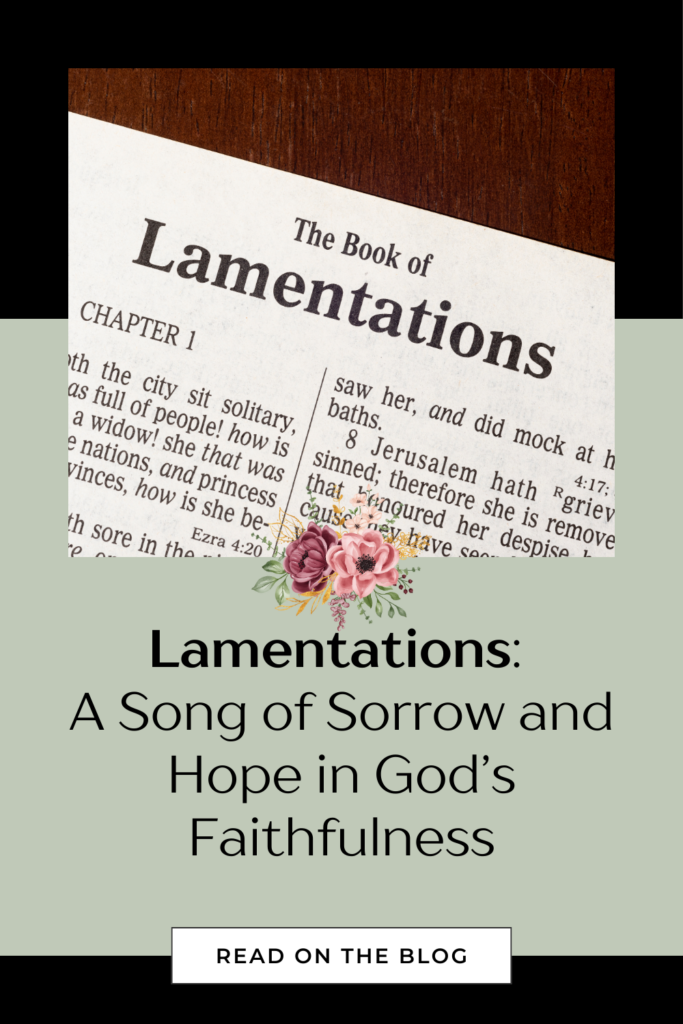The Book of Lamentations is a powerful expression of grief, written by the prophet Jeremiah after the fall of Jerusalem. The Babylonians destroyed the city in 586 B.C., leaving the Israelites in devastation. They faced the consequences of their sin and rebellion. This post explores the themes, structure, and significance of Lamentations, focusing on God’s faithfulness even in sorrow.
Background of Lamentations
Lamentations is a collection of five poetic laments, traditionally attributed to Jeremiah, who witnessed Jerusalem’s destruction and the Israelites’ exile. It responds to the tragedy described in 2 Kings 25, where the city is sacked, and its people are captured.
The book structures itself as elegies, each reflecting the pain and loss of the people. Despite the grief, the book reminds us of God’s enduring faithfulness, even in the darkest times.
Where You Can See Jesus in Lamentations
In the Suffering Servant: Lamentations expresses deep sorrow, similar to how Jesus came as a man of sorrows, acquainted with grief. He bore humanity’s sin and suffered on our behalf, much like Israel’s consequences for sin (Isaiah 53:3, Matthew 27:27-31). Through His suffering, Jesus made a way for redemption.
In God’s Faithfulness: Lamentations 3:22-23 speaks of God’s unfailing love. This echoes the faithfulness shown through Jesus, whose sacrifice on the cross expressed God’s enduring love. Just as the poet of Lamentations looked forward to restoration, we look to Jesus as the fulfillment of God’s promise (Romans 8:31-39, Hebrews 13:8).
In the Promise of Restoration: Lamentations ends with a prayer for restoration. The Israelites held onto the hope of God’s future restoration, which finds fulfillment in Jesus. Through His death and resurrection, He restores humanity to God (2 Corinthians 5:18-19, Revelation 21:3-4).
Key Themes in Lamentations
Grief and Mourning: Grief is natural, and Lamentations shows us that expressing sorrow is okay. However, grief should be paired with turning to God, acknowledging His sovereignty, and seeking His healing.
The Consequences of Sin: Lamentations reminds us that sin has consequences. The destruction of Jerusalem resulted from Israel’s unfaithfulness. We, too, must examine our lives, confess sin, and turn back to God in repentance (1 John 1:9).
God’s Justice and Wrath: Lamentations emphasizes God’s justice. His judgment, while painful, is always righteous and necessary. It encourages us to trust in His sovereignty and not take matters into our own hands.
God’s Faithfulness: Despite pain, Lamentations reminds us of God’s faithfulness. His mercies are new each morning, and His love never fails. We can take comfort in knowing that, even in our darkest times, God remains faithful (Romans 8:28, Hebrews 10:23).
Hope and Restoration: The prayer for restoration in Lamentations points to the ultimate hope we have in Christ. Jesus brings ultimate restoration through His sacrifice. In Him, we are reconciled to God and assured of future glory and eternal life (Romans 5:10-11, Revelation 21:4).
How We Can Apply Lamentations to Our Lives Today
Grieve with Hope: Grief is a part of life. Lamentations teaches us that we can grieve, but we grieve with the hope that God’s faithfulness will sustain us and restore us in His perfect timing.
Repent and Turn Back to God: Just as Israel was called to repentance, we are called to examine our hearts and repent of sin. God is faithful to forgive and restore when we turn to Him with humility and faith (1 John 1:9).
Trust in God’s Justice: Lamentations reminds us that God is just. His judgment is a righteous response to sin. We can trust that He will right every wrong in His perfect time.
Find Comfort in God’s Faithfulness: In trials, remember that God’s mercies are new each morning. Even when we don’t understand our circumstances, we can take comfort that God’s love never fails (Romans 8:38-39).
Look Forward to Ultimate Restoration: Lamentations points to the hope of restoration in Christ. Even when things seem bleak, we can look forward to the day when God will restore all things, wipe away every tear, and make all things new (Revelation 21:3-4).
Conclusion
Lamentations is filled with sorrow, but it also offers hope. It reminds us of sin’s consequences and points to God’s faithfulness and the promise of restoration. As we grieve, we can trust in God’s mercy and love. Ultimately, Lamentations points us to the hope we have in Christ, who offers restoration, reconciliation, and eternal life.
Call to Action
How does the message of God’s faithfulness in Lamentations encourage you today? Share your thoughts in the comments, and let’s reflect on the hope and restoration we have in Jesus.






